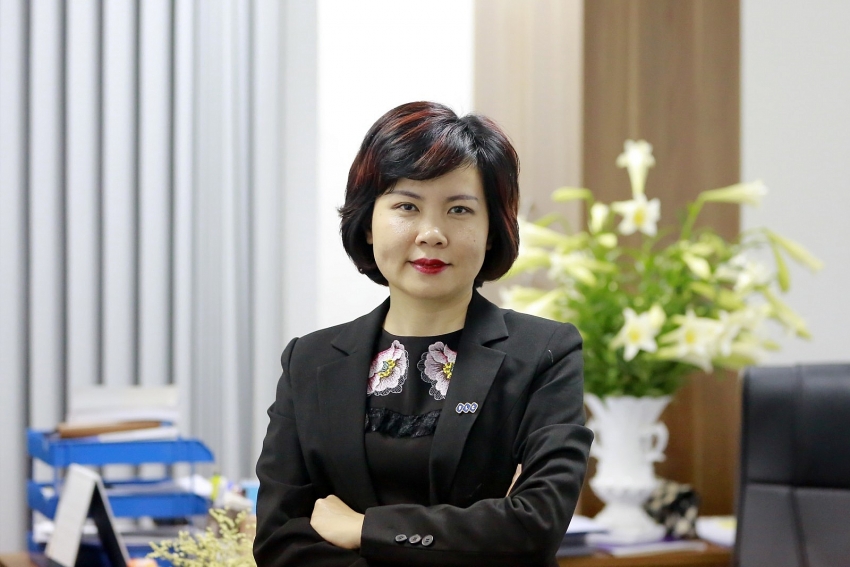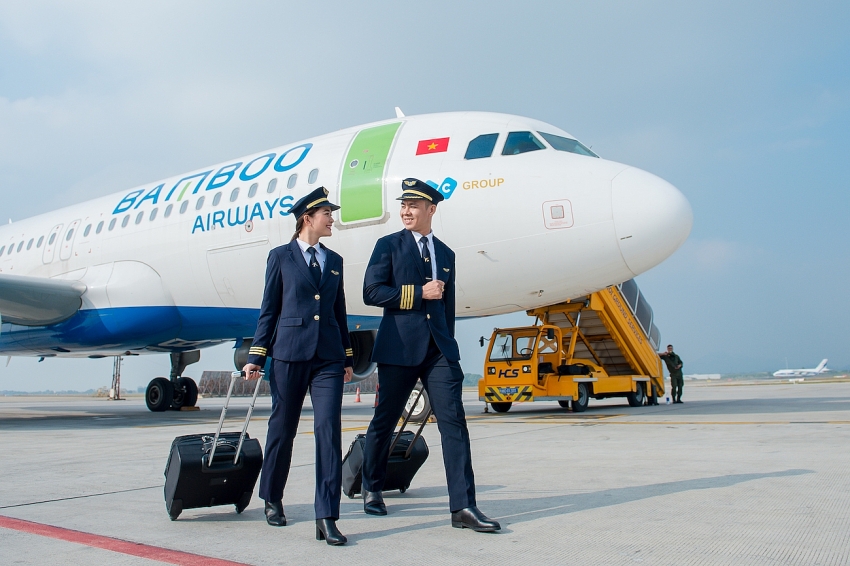A remarkable year for FLC from the perspective of human resources
 |
| Vo Thuy Duong, deputy general director, FLC Group |
The impact of the pandemic was felt acutely in the human resources (HR) field. How did the Board of Directors at FLC Group maintain the operations resources of the system during the social distancing period while simultaneously preparing recovery plans for the later period?
As soon as the first news of the pandemic came out in early 2020, FLC’s Board of Directors held an urgent meeting and under the straightforward directions from the Board of Directors and the Board of Management, we immediately applied several emergency policies to quickly respond to the new situation, such as comprehensively reviewing operating procedures, setting out an alternative working system, restructuring departments, as well as outlining a series of scenarios on HR policy with distinct undertakings for different levels of crisis.
We parsed through which departments could work online and which ones had to be present at the office, how many of our staff were essential to maintain operations, and other similar issues. All these questions needed to be carefully calculated in order to both ensure the interests of employees and the group’s daily operations. This is definitely no simple task, considering the diverse ecosystem, including the various industries and fields of operation of FLC Group.
What were the most significant challenges during this undertaking, especially with such drastic changes in policies?
The first few months of 2020 were probably the first time in a decade that we have truly experienced a short but relatively "slow" period at FLC.
However, this short breather has opened up many valuable opportunities, one of which was the chance to take time out to look directly at the things that have been done and to continue sorting and restructuring the system.
In order to succeed in this, enforcing policies from the top are a necessity, but it is more important to create a good flow so that both the heads and staff can understand how the system is operating, what goals should be achieved, and what needs to be changed.
This way, each individual can understand their role and how it aligns with the greater vision and strategies of the system of thousands of other people working towards the same goal.
What was your most profound impression about FLC staff during the social distancing period?
The most impressive thing was probably the connection and sharing from the team, who were always ready to join hands for a common goal.
Even in the most challenging times, we were still able to see Bamboo Airways pilots and crew members on the front lines showing undiminished pride and joy in operating repatriation flights, overcoming the fear of the pandemic.
At FLC hotels and complexes, while taking care of the guest’s health, meals, sleep, and experiences, the staff was constantly reminding each other to comply maximally with anti-pandemic regulations to ensure absolute safety for the community.
Leaders of FLC were also overwhelmed by thousands of shares and messages from managers and employees about encouragement, dedication, and supporting each other.
These are what made 2020 a remarkable year for FLC.
Looking back a year later, how would you summarise the HR policy of FLC in 2020 and the plans for 2021?
In a challenging year like 2020, FLC still increased employee count by nearly 2,300, with the aviation sector accounting for more than 700 employees.
It is expected that next year, we will recruit about 3,000 new employees across the system, 30 per cent of whom will be in the aviation segment due to the huge demand for pilots, engineers, and crew members to operate about 50 Bamboo Airways aircraft in 2021.
Thus, it is estimated that in 2021-2022, our HR network will reach about 15,000-17,000 people.
This is quite surprising news considering you are involved in many business lines that were severely affected, such as tourism and aviation where most companies had to cut down on human resources. How did you do it?
Since the end of the second quarter of 2020, FLC has managed to restore most of its production and business activities, while simultaneously launching many new projects, hotels, as well as opening new flight routes.
This means our demand for employees has continued to grow.
Counted separately in the field of resort and tourism, each complex with an active golf course requires 1,500-3,000 employees. In the field of real estate, we are researching to invest and promote more than 300 projects in nearly 60 provinces, so HR planning can only increase.
In the field of aviation, we currently have more than 2,000 employees, but this number will definitely increase drastically as Bamboo Airways expands its market share and flight network.
FLC Group will recruit for more than 30 units in approximately 10 areas and key industries, with international personnel accounting for 7-10 per cent.
 |
| In a challenging year like 2020, FLC still employed nearly 2,300 employees |
In the professional and notoriously high-pressure environments where FLC Group operates, what do you need to retain HR – especially skilled and talented personnel?
In order to retain talented employees, I think the balance between the fundamental factors like remuneration, good promotion opportunities, and professional working environment is critical.
FLC has a diverse welfare system with about 24 policies. In particular, the salary system is built and applied flexibly according to the individuals’ competences and their position and is generally competitive in the labour market.
Even in an industry such as aviation, Bamboo Airways’ remuneration policy was rated as the best in the domestic market before the pandemic and even today, and is more lucrative than the market average.
One of the outstanding policies is to create opportunities for employees to enjoy high-quality products in the group's ecosystem, from complimentary flights, free resort rooms, preferential house and share purchase policy, or access to products and services from FLC's reputable domestic and foreign partners.
For example, in a real estate project, employees can buy products with a discount of up to 40 per cent on the land price, with preferential interest rates. I think this is quite an edge over other businesses.
You have just mentioned the salary, bonus, and incentives, but is physical treatment always the ultimate key to retaining talent?
Salary, bonuses, and incentives are of course the most important factors, but I think building a corporate culture that is similar to a family is also extremely important to attract talent. Not all businesses can do it successfully.
FLC Group’s chairman Trinh Van Quyet has been repeatedly calling the company the first home along with your own family, and he himself is an example of this. He goes home to meet his family at night, but coming to work the next morning also feels like coming home. Having that mindset, the company is a family, co-workers are brothers and sisters, and taking care of the company is also taking care of your own house.
At FLC, anyone has the right to share their views, employees can send their opinions directly to senior leaders, even to the chairman of the group.
This is where all employees, from the smallest positions, are given equal opportunities to learn, work, promote, nurture their passion, and develop themselves.
This is perhaps the real universal key to keeping talented employees in the FLC family.
 |
| Every employee is a brand ambassador |
The faster the business grows, the bigger the HR challenge. How do you experiences this at FLC?
In fact, HR is always one of the most persistent issues for businesses, and this is doubly true for a diverse ecosystem like FLC.
For example, when operating a 5-star complex in a new province, we encounter many difficulties in recruiting high-quality personnel, as prior to FLC's investment, the locality had almost no high-grade tourism infrastructure.
What we do is maintain a diverse recruitment network covering all channels, from linking with universities to recruiting high-quality human resources through prestigious domestic and international partners.
To recruit staff for Bamboo Airways, we also cooperate with more than 10 international pilot supply partners to be able to cover our extensive operation plans.
However, in the long-term, we are specifically focusing on training HR autonomously.
Can you share the specifics of the training plans of FLC and Bamboo Airways?
In recent years, FLC has invested hundreds of billions of VND in training including long-term training projects such as FLC University that provides international-standard education with the first “university town” model in Quang Ninh, or Bamboo Airways' Aviation Academy in Quy Nhon which can welcome thousands of students, while another aviation training centre is planned to be opened in Vinh Phuc.
So far, Bamboo Airways have been actively arranging technical personnel and crew members, with the former assessed to have the best skills and service attitudes in the industry, equivalent to the standards of international 5-star airlines.
The pilot training programme is being implemented with great success, with nearly 50 pilots trained in 2020 and plans to train 150 more basic and cadet pilots in 2021. In 2023, the airline is expected to reach complete autonomy in pilot personnel.
What else would you highlight about your HR approach?
We have this view: every employee is a brand ambassador!
And in industries like tourism or aviation, employees are not only ambassadors of the business but sometimes also ambassadors of a locality and the entire country.
The flight attendants are the first point of contact with passengers who will then be welcomed by staff at complexes, resorts, and other accommodation facilities. Each FLC complex can accommodate 3,000-5,000 visitors at a time, and we constantly have to train and coordinate staff so that 5-star service quality is always maintained, delivering customers the finest experience.
And if the staff makes a bad impression on the guests, not only the corporate brand will be affected, but also the image of regional and national tourism. We always make sure to remind our staff of this.
What the stars mean:
★ Poor ★ ★ Promising ★★★ Good ★★★★ Very good ★★★★★ Exceptional
Related Contents
Latest News
More News
- State corporations poised to drive 2026 growth (February 03, 2026 | 13:58)
- Why high-tech talent will define Vietnam’s growth (February 02, 2026 | 10:47)
- FMCG resilience amid varying storms (February 02, 2026 | 10:00)
- Customs reforms strengthen business confidence, support trade growth (February 01, 2026 | 08:20)
- Vietnam and US to launch sixth trade negotiation round (January 30, 2026 | 15:19)
- Digital publishing emerges as key growth driver in Vietnam (January 30, 2026 | 10:59)
- EVN signs key contract for Tri An hydropower expansion (January 30, 2026 | 10:57)
- Vietnam to lead trade growth in ASEAN (January 29, 2026 | 15:08)
- Carlsberg Vietnam delivers Lunar New Year support in central region (January 28, 2026 | 17:19)
- TikTok penalised $35,000 in Vietnam for consumer protection violations (January 28, 2026 | 17:15)

 Tag:
Tag:



















 Mobile Version
Mobile Version